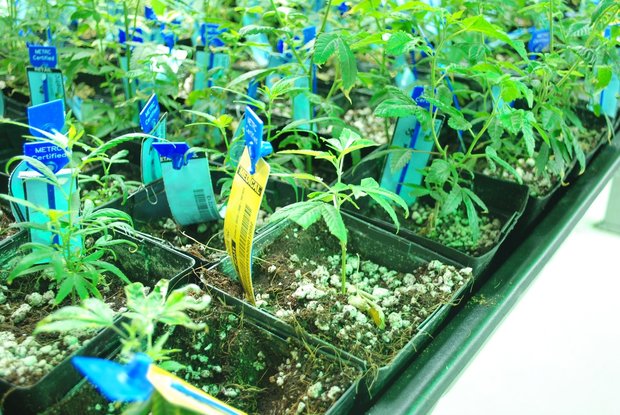You are here
Home 🌿 Marijuana Business News 🌿 Ohio Medical Marijuana Entrepreneurs Want Residency Requirement for Business Licenses 🌿Ohio Medical Marijuana Entrepreneurs Want Residency Requirement for Business Licenses

Ohioans who want to start a medical marijuana business here urged regulators on Monday to issue the few lucrative cultivator licenses to Ohio residents only, at least initially.
As it stands now, the Ohio Department of Commerce plans to award up to 12 large grow licenses and 12 small grow licenses statewide, based on criteria including a company's business plan, security measures and industry experience.
Proof that the company is headquartered in Ohio, owned by Ohioans and plans to hire in-state workers factor into the review but are not required.
Kelly Mottola, who owns Hydro Innovations in Hilliard, said out-of-state companies will want to bring out-of-state workers.
"We're the ones who fought for this," Mottola said during a public meeting about the proposed cultivator licensing process. "Allowing people from outside the state is not benefiting Ohio or Ohioans or our unemployment."
Several people spoke in favor of a residency requirement Monday during the final public comment period on the cultivator rules. Others criticized the high cultivator fees, which would cost more than programs in all but two medical marijuana states, and the requirement that local officials approve of a business' plan to locate there.
A panel of state lawmakers will meet in a few weeks to review the rules, which must be finalized by May 6.
Residency requirements
Residency requirements have been part of several other states' medical and recreational marijuana programs. For example, Colorado required licensees live in the state at least two years before applying for a license. Lawmakers there recently reduced the requirement to one year and allowed greater out-of-state investment.
Ohio has no such requirement for cultivators, processors or dispensary owners, but testing labs are limited to Ohio colleges and universities for the first year of the program.
Kevin Schmidt of the national group Marijuana Policy Project said it might be difficult for Ohioans to compete for licenses with more experienced out-of-state companies. He suggested a residency requirement for applicants with ownership or a controlling interest for at least the first year of the program.
"Ohioans should be given a chance to get established," Schmidt said.
The case for out-of-state investment
Many of the plans for cultivation centers and dispensaries bubbling up across the state come from Ohioans partnering with out-of-state companies and consultants. The Ohioans have connections with local officials and in-state investors; the out-of-state companies bring much-needed capital and knowledge of how to complete legal-intensive license applications and run a successful marijuana business.
Oregon dispensary owner Jason Kabbes said there are likely other out-of-state residents like him -- native Ohioans who want to work in the industry in their home state. Kabbes is a Springfield native who graduated from Ohio State University and moved to Oregon to work in the cannabis industry.
When Ohio lawmakers legalized medical marijuana last year, Kabbes told his parents he was moving home. He's partnering with Ohio residents with the goal of obtaining a cultivation or dispensary license here.
"When you say these other folks in the industry are outsiders, they care about cannabis just as much as anybody and may care as much about Ohio as much as you guys," Kabbes said.
Cultivator requirements have changed
Ohio's medical marijuana law allows people with one of 21 medical conditions to buy and use marijuana if recommended by a physician. Most of the details of the program, such as who will grow and sell marijuana and how much patients can buy, were left to three state agencies.
The Department of Commerce developed rules for cultivators, which have been revised after two public comment periods.
- The number of initial cultivator licenses was expanded to 24 -- 12 "Level I licenses for up to 25,000 square feet of growing space and 12 "Level II" licenses for up to 3,000 square feet.
- Growers would pay a $20,000 application fee and $180,000 license fee for a Level I license and a $2,000 application fee and $18,000 license fee for a Level II license.
- Licenses would not be awarded by region, as initially planned, but geographic diversity will be considered.
- Applicants would have to demonstrate they have $500,000 in liquid assets for a Level I license and $50,000 in assets for a Level II license.
- Licensees would have to set up an escrow account or provide a surety bond -- $750,000 for Level I and $75,000 for Level I.
420 Intel is Your Source for Marijuana News
420 Intel Canada is your leading news source for the Canadian cannabis industry. Get the latest updates on Canadian cannabis stocks and developments on how Canada continues to be a major player in the worldwide recreational and medical cannabis industry.
420 Intel Canada is the Canadian Industry news outlet that will keep you updated on how these Canadian developments in recreational and medical marijuana will impact the country and the world. Our commitment is to bring you the most important cannabis news stories from across Canada every day of the week.
Marijuana industry news is a constant endeavor with new developments each day. For marijuana news across the True North, 420 Intel Canada promises to bring you quality, Canadian, cannabis industry news.
You can get 420 Intel news delivered directly to your inbox by signing up for our daily marijuana news, ensuring you’re always kept up to date on the ever-changing cannabis industry. To stay even better informed about marijuana legalization news follow us on Twitter, Facebook and LinkedIn.




